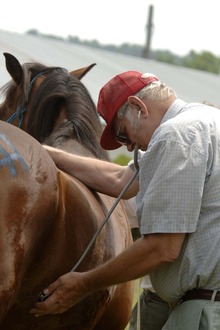Dr. Dan Ahnen, one of several veterinarians from Siloam Springs, Ark. who rotate a week at a time in the Southwest City Veterinary Clinic is a veterinarian who stresses the importance of preventative medicine for animals including horses, cows, and small animals.

Veterinarian checking horse gut sounds
Preventative medicine includes vaccines, a yearly physical and dental exam, fecal exams for internal parasites, and appropriate deworming strategies.
© 2012 by Carien Schippers
Some of his outreach visits are for the continued wellness of farm animals. When asked if it is just as important for animals to see veterinarians regularly to stay in good health as it is for humans to see doctors, his response is, “Absolutely.”
As far as horses go, it’s colic that has to be watched for because it can be fatal.
“There are lots of di◊erent reasons a horse gets colic,” he said. “Anything from eating inappropriate food to a gas buildup or dehydration.”
Veterinarians at Blue Mountain Equine in Madison County, Virginia, echo Dr Ahnen's thoughts on the importance of preventative medicine."
Preventative medicine is probably the least tangible but most important aspect of Equine Veterinary Care. Preventative medicine includes Spring and Fall vaccines, twice yearly physical exam, dental exam and necessary treatment, fecal exams for internal parasites, and appropriate deworming strategies."
Reports show that while vaccines are an integral part of horse care, with the economic downturn many horse owners have begun to put off vaccinating their horses or are not vaccinating at all.
Because of the failure to follow timely vaccine protocols, there has been an increase in the number of Eastern equine encephylitis and rabies cases across the country. Veterinarians are also seeing an increase in the number of horses with West Nile virus and tetanus.
These diseases can be deadly and every horse owner should follow the minimum recommended vaccines by the American Association of Equine Practitioners which are: Eastern and Western Encephylitis, Tetanus, West Nile Virus, and Rabies.
Equine dentistry is extremely important to the health of any horse. Yearly checkups are important to determine whether the horse's teeth need to be floated and to catch any dental problems before they lead to serious nutritional problems for the horse.
In addition, a yearly, or twice yearly, physical exam is a good opportunity to find problems before they become significant issues.
Last, but certainly not least, is parasite control. Although most horse owners deworm their own horses, a veterinarian provides a valuable service by examining fecal manure samples to determine a horse's level of infection and the efficacy of the present deworming strategy.
Over the years horse owners and veterinarians may have done too good a job of deworming horses. This has led to parasite resistence and if this continues there is the possibility of developing “super worms” which could be resistant to the dewormers available today.
If you are still deworming your horses on an every six to eight week basis it is time to revise your strategy.
As many veterinarians advise: The most important thing to remember is that the best way to treat a health problem with your horse is to keep it from happening to begin with.
